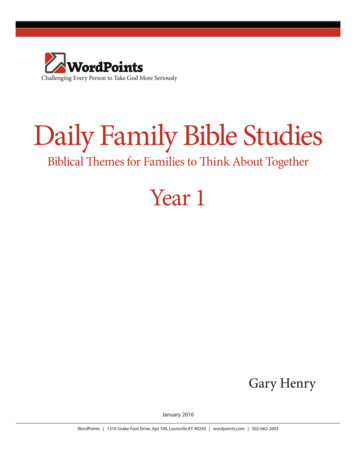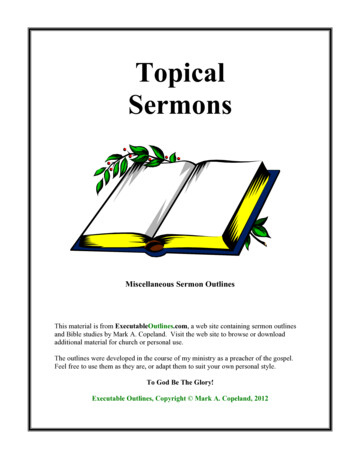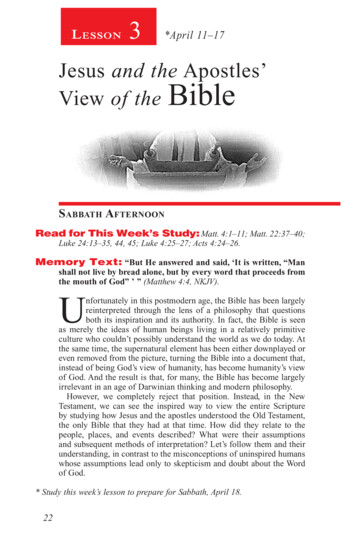
Transcription
WordPointsChallenging Every Person to Take God More SeriouslyDaily Family Bible StudiesBiblical Themes for Families to Think About TogetherYear 1Gary HenryJanuary 2016WordPoints 1310 Snake Foot Drive, Apt 104, Louisville KY 40243 wordpoints.com 502-682-2603
Daily Family Bible Studies: Biblical Themes for Families to Think About Together (Year 1)Gary HenryJanuary 2016WordPoints.com 2016All rights reserved. No part of this work may be reproduced or transmitted in any formor by any means, electronic or mechanical, including photocopying, recording, or by anyinformation storage or retrieval system, without written permission from the author,except for the inclusion of brief quotations in a review.Unless otherwise indicated, all Scripture quotations are fromThe Holy Bible, English Standard Version, copyright 2011 by Crossway Bibles.Notice to Copy ShopsThis material is copyrighted, but permission is hereby given to make as many copiesas requested by your customer, as long as these are for personal, study-group, or church use,and not for resale or commercial purposes.WordPoints1310 Snake Foot Drive, Apt 104Louisville KY 40243502-682-2603Website: wordpoints.comEmail: garyhenry@wordpoints.com–2–
PREFACEMany years ago I began producing a series of Bible studies tied to the theme of my Sundaymorning sermons. Whatever the topic of the lesson the congregation heard, they could take home acopy of the Daily Family Bible Studies that would allow them, as families, to talk about the lesson throughout thecoming week. Families in the church, especially those with young children, found this to be a way to dig moredeeply into what they heard the preacher say and discuss its practical application.Over time, these Daily Family Bible Studies have been used not just by families but by individuals, small groups,and Bible classes to provide a five-lesson set of topics for meditation and discussion. Four years’ worth of thesestudies are now available: (1) in the form of PDF ebooks, and (2) as posts on the WordPoints.com website.Readers can also subscribe to an email which arrives each Saturday morning with the study for the followingweek. (If you’d like to subscribe, https://wordpoints.com/subscribe/ is the web address to go to.)There is great value in families talking about God’s word together (Deut. 6:6-9). If we intend to transmit ourfaith to our families (2 Tim. 1:5), we must do more than take our kids to church services: we must talk aboutGod at home. These Daily Family Bible Studies are meant to foster the habit of family Bible study. If you haveanother study tool that accomplishes that purpose, by all means use it; many such resources are available nowadays. But if you need something to get you started, these studies might give you the nudge you need.But you don’t have to be a “family” to use these studies. Now that I live alone, I continue to use them myself.They make a good framework for a Monday-Friday Bible study or as the basis for one’s daily devotional time.These themes are adaptable to a wide range of uses. I hope you’ll “take the ball and run with it” — be creativeand see what you can do to modify these lessons for your own use.The English Standard Version is used as the base translation for the studies, and the New King James Version isoften used for comparison. But you can use the studies with whatever translation you normally use. When thereare differences in translation, you will profit from discussing which translation you think most clearly brings outthe true meaning of the passage. (And it may not be the one you simply like the best.)Each day’s study ends with some words of wisdom from Proverbs. In sequence, these readings go straightthrough Proverbs in two years. In other words, Years 1-2 cover the entire Book of Proverbs, as do Years 3-4.The lessons are set up in a yearly format, with 52 lessons for each “year,” but you don’t have to start January 1.Feel free to use any of the lessons at any time. That said, starting off a new year with this kind of plan is a goodway to have a better year. To families as well as individuals, I recommend beginning each new year with somespecific goals for spiritual growth. It’s not enough to say, “We need to do better.” The question is: what activitiesare we going to engage in that might make a difference . . . and will we stick with them?–3–
As a preacher, I always tried to be balanced in my choice of topics. Not all of the themes here (based as theywere on sermons) are equally suitable for children, but I believe that even the more “adult” topics are importantfor families to discuss, and each topic is adaptable to any age group. There is some repetition in the topics, andthat is intentional. I believe in the value of spaced repetition, so don’t fear to use a study that sounds very similarto another study from several months ago. It will help you to look at that theme from a little different angle.And that brings me to the subject of adaptation. When I originally wrote these studies, people would sometimessay, “These studies don’t fit the age of our children” or “This kind of format doesn’t work for us.” Well, I admitthat I wrote these lessons for my own use as a father in those days, and I confess to having my own children inmind as I wrote them. But any Bible study tool, no matter who it’s written by, will need to be adapted by anybody else who uses it. So whoever you are, I never meant that you could use these studies “straight out of thebox,” just as they are. I meant them only as a suggestion. Depending on the specifics of your situation, you willhave to modify these lessons in some ways. But I hope you will find them suggestive. They will give you something to work with, so you don’t have to start from scratch in devising your family Bible studies. At the veryleast, the topics for the studies will give you some subjects your family could discuss. If all you do is take thesetopics and teach them to your kids in your own way, you will have done well.And as for the topics, many have told me they have used the topics for Wednesday night invitation talks, tabletalks at the Lord’s Supper, small-group studies, or even sermons. So the index of topics is a good “idea thesaurus,”if nothing else. If the question “What can I talk about?” ever stumps you, here are some ideas to get you started.Some find the discussion questions in the lessons “too simple.” My response is that “common sense is not alwayscommon practice.” People often overestimate how much they understand the “simple” things they know. Youmight profit from talking about these basic truths again (in your own words, rather than the parrot-language wenormally use). But again, the questions were only meant to be suggestions. Don’t just give the obvious answer,but discuss the significance of the points made and talk about their application. Make this material your own.I’m often asked, “What is the best time of day for families to study together?” Well, there is no one-size-fits-allanswer to that question. Many families find the breakfast table is a good place to have a family devotional, butyou will need to figure out what works for your family. Whatever you come up with, I will tell you this: no timeis going to work if you are not willing to sacrifice to make it happen. If any little interruption that comes up isenough to derail your family Bible study, you may as well quit saying that Bible study is a priority in your family.If there is one recommendation I would make, it is this: whatever you do, keep the Scripture text for each day’sstudy the central focus of the study. Don’t just use the idea of the study as a springboard for opinion sharing;keep the passage at the center of your discussion. What does the passage teach? How can we use this passagetoday? You want these studies to be Bible studies — and not just topical talks on abstract ideas.If you wish to print or make copies of these lessons, you have our permission to do so. (See the “Note to CopyShops” on the copyright page.) There is no need to write us and ask for permission. We want this work to be aswidely distributed as possible. The more copies people make, the more the author will like it.Thanks to all who have used these studies over the years. At present, nearly a thousand of you get them by emailevery week! May God bless you for your interest in daily . . . family . . . Bible studies.Gary Henry — WordPoints.com–4–
TOPICS - YEAR 11.We ought to be thankful for and obey everything in God’s word . . . . . . . . . . . . . . . . . . . . . . . . . . . . . . . . . . . 72.We grow stronger spiritually when we worship God together . . . . . . . . . . . . . . . . . . . . . . . . . . . . . . . . . . . . . . 93.God wants His people to work together in the church . . . . . . . . . . . . . . . . . . . . . . . . . . . . . . . . . . . . . . . . . . . 114.God wants us not only to know the right thing but to do the right thing . . . . . . . . . . . . . . . . . . . . . . . . . . . 135.We should set a godly example for those around us . . . . . . . . . . . . . . . . . . . . . . . . . . . . . . . . . . . . . . . . . . . . . 156.We are in the church which belongs to Christ only if we obey His word . . . . . . . . . . . . . . . . . . . . . . . . . . . . 177.God never commands anything that is not for our good . . . . . . . . . . . . . . . . . . . . . . . . . . . . . . . . . . . . . . . . . 198.Happiness is a product of the help we give to others . . . . . . . . . . . . . . . . . . . . . . . . . . . . . . . . . . . . . . . . . . . . . 219.We ought to put the Lord’s work ahead of our own interests . . . . . . . . . . . . . . . . . . . . . . . . . . . . . . . . . . . . . . 2310. Elders are given to us by God to help us grow spiritually . . . . . . . . . . . . . . . . . . . . . . . . . . . . . . . . . . . . . . . . . 2511. Jesus taught us to pray . . . . . . . . . . . . . . . . . . . . . . . . . . . . . . . . . . . . . . . . . . . . . . . . . . . . . . . . . . . . . . . . . . . . . . . 2712. God is our strength . . . . . . . . . . . . . . . . . . . . . . . . . . . . . . . . . . . . . . . . . . . . . . . . . . . . . . . . . . . . . . . . . . . . . . . . . 2913. We ought to look forward to the Lord’s Day . . . . . . . . . . . . . . . . . . . . . . . . . . . . . . . . . . . . . . . . . . . . . . . . . . . . 3114. We can expect the devil to make things difficult for us . . . . . . . . . . . . . . . . . . . . . . . . . . . . . . . . . . . . . . . . . . . 3315. Our homes should be places where we learn about God together . . . . . . . . . . . . . . . . . . . . . . . . . . . . . . . . . 3516. Youth is a time to love God and be faithful to Him . . . . . . . . . . . . . . . . . . . . . . . . . . . . . . . . . . . . . . . . . . . . . . 3717. It is a blessing to have fellowship with gospel preachers in other places . . . . . . . . . . . . . . . . . . . . . . . . . . . . 3918. God shows His love in the help that He gives us . . . . . . . . . . . . . . . . . . . . . . . . . . . . . . . . . . . . . . . . . . . . . . . . 4119. Jesus wants us to be His disciples . . . . . . . . . . . . . . . . . . . . . . . . . . . . . . . . . . . . . . . . . . . . . . . . . . . . . . . . . . . . . 4320. We should be willing to give up some things for the Lord . . . . . . . . . . . . . . . . . . . . . . . . . . . . . . . . . . . . . . . . 4521. Our families are good gifts that God gives to bless us . . . . . . . . . . . . . . . . . . . . . . . . . . . . . . . . . . . . . . . . . . . . 4722. If we walk with God, we grow closer to Him every day . . . . . . . . . . . . . . . . . . . . . . . . . . . . . . . . . . . . . . . . . . 4923. Our faith needs to be in God and not in things that will disappoint us . . . . . . . . . . . . . . . . . . . . . . . . . . . . . 5124. We should try to be as patient with others as God has been with us . . . . . . . . . . . . . . . . . . . . . . . . . . . . . . . 5325. Believing in God means that we trust Him . . . . . . . . . . . . . . . . . . . . . . . . . . . . . . . . . . . . . . . . . . . . . . . . . . . . . 5526. Whether we go to heaven depends on what we do with God’s word . . . . . . . . . . . . . . . . . . . . . . . . . . . . . . . 57–5–
27. Being a hypocrite is one of the worst things in the world . . . . . . . . . . . . . . . . . . . . . . . . . . . . . . . . . . . . . . . . . 5928. The first day of the week is a day to remember the Lord . . . . . . . . . . . . . . . . . . . . . . . . . . . . . . . . . . . . . . . . . . 6129. We should grow wiser by learning from the experiences others have had . . . . . . . . . . . . . . . . . . . . . . . . . . 6330. God wants us to think before we act . . . . . . . . . . . . . . . . . . . . . . . . . . . . . . . . . . . . . . . . . . . . . . . . . . . . . . . . . . . 6531. In both word and deed, we should be thankful for God’s blessings . . . . . . . . . . . . . . . . . . . . . . . . . . . . . . . . 6732. There are many doctrines and practices that Christ does not approve of . . . . . . . . . . . . . . . . . . . . . . . . . . . 6933. If we are faithful, we can look forward to Jesus coming again . . . . . . . . . . . . . . . . . . . . . . . . . . . . . . . . . . . . . 7134. To be in the kingdom of God means being a worker in the kingdom . . . . . . . . . . . . . . . . . . . . . . . . . . . . . . 7335. God requires that we pay serious attention to Him . . . . . . . . . . . . . . . . . . . . . . . . . . . . . . . . . . . . . . . . . . . . . . 7536. We should not participate in the sins that are around us in the world . . . . . . . . . . . . . . . . . . . . . . . . . . . . . . 7737. God can do things that are greater than we think are possible . . . . . . . . . . . . . . . . . . . . . . . . . . . . . . . . . . . . 7938. We ought to give of our best to the Master . . . . . . . . . . . . . . . . . . . . . . . . . . . . . . . . . . . . . . . . . . . . . . . . . . . . . 8139. Deacons are given to help us in the Lord’s work . . . . . . . . . . . . . . . . . . . . . . . . . . . . . . . . . . . . . . . . . . . . . . . . . 8340. The message of the gospel is the message of the cross . . . . . . . . . . . . . . . . . . . . . . . . . . . . . . . . . . . . . . . . . . . . 8541. We show our interest in God by the way we listen to gospel preaching . . . . . . . . . . . . . . . . . . . . . . . . . . . . . 8742. God always keeps His promises and fulfills His purposes . . . . . . . . . . . . . . . . . . . . . . . . . . . . . . . . . . . . . . . . 8943. We can learn to win souls for Christ . . . . . . . . . . . . . . . . . . . . . . . . . . . . . . . . . . . . . . . . . . . . . . . . . . . . . . . . . . . 9144. Hearing the gospel preached is both a pleasure and a privilege . . . . . . . . . . . . . . . . . . . . . . . . . . . . . . . . . . . . 9345. The church is healthy and grows when each member does his part . . . . . . . . . . . . . . . . . . . . . . . . . . . . . . . . 9546. Jesus died on the cross in order to save us from our sins . . . . . . . . . . . . . . . . . . . . . . . . . . . . . . . . . . . . . . . . . 9747. There is a difference between temporal wealth and true riches . . . . . . . . . . . . . . . . . . . . . . . . . . . . . . . . . . . . 9948. We need to check ourselves constantly to see if we are doing God’s will . . . . . . . . . . . . . . . . . . . . . . . . . . . 10149. The best things in life are the things that make us more like God . . . . . . . . . . . . . . . . . . . . . . . . . . . . . . . . . 10350. Faith means trusting God’s faithfulness . . . . . . . . . . . . . . . . . . . . . . . . . . . . . . . . . . . . . . . . . . . . . . . . . . . . . . . 10551. It is presumptuous to make up special religious observances which God has not commanded . . . . . . . 10752. We should study the Bible every day . . . . . . . . . . . . . . . . . . . . . . . . . . . . . . . . . . . . . . . . . . . . . . . . . . . . . . . . . 109–6–
Daily Family Bible Studies 101We ought to be thankful for and obeyeverything in God’s wordThe Psalmist said, “Your word is a lamp to my feet and a light to my path” (Psa. 119:105).When we recognize the many benefits and blessings that come to us through God’s word, weshould be grateful that He has chosen to impart His truth to us. And even when the truth hurtsour conscience and shows us where we ought to be doing better, it is still true that we ought to bethankful for and obey everything in God’s word. Far from being a burden, God’s word is a greatblessing we are privileged to enjoy.Many of us have been learning from the Bible since childhood, and we know a great deal aboutGod’s will. So our main problem is often not a lack of knowledge, but rather a resistance to theknowledge we already have. Like the foolish man who built his house on the sand (Mt. 7:26,27),we hear the Lord’s words but don’t do anything about them. And while this may seem like simplenegligence, such unresponsiveness to what we know of the Lord’s will is actually a worse problemthan that of the person who has not even heard what the Lord’s will is (Lk. 12:47,48).Ultimately, how thankful and respectful we are toward God’s word is judged not by what we saybut by what we do. Jesus said, “Why do you call me ‘Lord, Lord,’ and not do what I tell you?” (Lk.6:46). We must not be selective or picky about which parts of God’s word we’re willing to obey.As the Lord’s people, we need to develop an attitude of eagerness for divine truth as a whole — anobedient thankfulness for all that God has said. And not only is eagerness to obey important initself; it’s the key to growing in our understanding of God’s will in the future.People in the world around us have no real respect for the Bible. Many people simply don’t carewhat God may have said. So it’s very important that we instill in our minds (and in the minds ofour young people) an attitude of gratitude and receptiveness with respect to the truth contained inthe Scriptures. We need to have tender, teachable spirits that are easily moved by divine instruction, eager to hear everything God says. This week, let’s meditate on the goodness of all that Godhas revealed. Let’s concentrate on increasing our responsiveness to God’s word, whatever it mayhave to say. Let’s learn to love the truth and eagerly receive it!Monday: 1 Samuel 3:1-18Key Idea: We should always be ready to listen attentively to God’s word.Questions for Family Growth: What was the name of the priest whom the boy Samuel helpedas a servant? What did he tell Samuel to say when God called? How does God speak to us today?In what manner should we listen?Wisdom for the Day: Proverbs 1:1-6.–7–
Tuesday: Psalm 119:97-104Key Idea: Without God’s word, we can’t grow in understanding and obedience.Questions for Family Growth: What does it mean to “meditate” on God’s word? How sweetdid the writer say God’s word was? In v.104, what did he say he received through God’s precepts?In your own words, what does that mean?Wisdom for the Day: Proverbs 1:7.Wednesday: 2 Kings 22:8-20Key Idea: Even when God’s word shows that we have sinned, we still ought to listen.Questions for Family Growth: What did Hilkiah the priest find in the House of the Lord?What did Josiah the king do when this writing was read to him? In v.19, what did God say aboutJosiah’s attitude toward His word?Wisdom for the Day: Proverbs 1:8,9.Thursday: Jeremiah 36:1-3,20-26Key Idea: It is wrong to disregard and disobey what God says.Questions for Family Growth: Where did the scroll come from that was read to Jehoiakim theking? What did it say? What did Jehoiakim do to the scroll as it was read to him? What attitudetoward God and His word do you think was reflected in Jehoiakim’s actions?Wisdom for the Day: Proverbs 1:10-19.Friday: Psalm 119:9-16Key Idea: Even when we are young, we ought to love God’s word.Questions for Family Growth: What does v.9 say a young person can do by paying attention toGod’s word? In v.16, what do you think these words mean: “I will delight in your statutes” and “Iwill not forget your word”?Wisdom for the Day: Proverbs 1:20-33.Gary Henry — WordPoints.com–8–
Daily Family Bible Studies 102We grow stronger spiritually whenwe worship God togetherGod has graciously supplied our every need, including our need to be edified in spiritual matters. He knew we would face difficulties and discouragements, and He wisely provided themeans for us to be strengthened. One of these means is the public worship assembly of the church.We grow stronger spiritually when we worship God together. And because this is true, we oughtto have a high regard for those occasions when the church gathers to worship.It is helpful to remember that our worship services are not an end in themselves but rather ameans to an end. Paul said that God does not dwell in any temple that we could make: “Nor is heserved by human hands, as though he needed anything, since he himself gives to all mankind lifeand breath and everything” (Ac. 17:25). The acts through which we worship God are importantin themselves, to be sure, but God wants us to get the inner strength and spiritual maturity thatcome from these things. God does not need our worship — we do. If we neglect our worship orfail to appreciate its purpose, we will decline spiritually. None of us is an exception to the rule thatChristians need to worship with other Christians.The Hebrew writer pointed to the need for the Lord’s people to assemble together regularly: “Letus hold fast the confession of our hope without wavering, for he who promised is faithful. And letus consider how to stir up one another to love and good works, not neglecting to meet together,as is the habit of some, but encouraging one another, and all the more as you see the Day drawingnear” (Hb. 10:23-25). Love and good works need to be stirred up in each of us, and our gatheringfor worship is a prime means of such stimulation. Just as a burning ember dies when it is separatedfrom the fire, those who neglect the practice of gathering with their fellow Christians for worshipare likely to grow cold in their devotion to God.God has never required anything that is not good for us. We should be glad about the privilege ofworship. David’s sentiment is a worthy one to emulate: “I was glad when they said to me, ‘Let us goto the house of the Lord!’” (Psa. 122:1). This week, let’s determine to have a deeper gratitude forthe many good things that can happen when we worship together as we should.Monday: Acts 2:37-47Key Idea: In the New Testament, the church met frequently to worship.Questions for Family Growth: In v.42, what does it say the members of the Jerusalem church“devoted” themselves to? In v.46, how often did they meet together in the temple courts for worship? Does it seem that they enjoyed worshiping together?Wisdom for the Day: Proverbs 2:1-15.–9–
Tuesday: Acts 20:7-12Key Idea: In the New Testament, church assemblies sometimes lasted a long time.Questions for Family Growth: When did the disciples come together “to break bread”? Whatevents had happened on that day of the week that would have made it a special day for Christians?How long did Paul speak on this occasion? Why was the group willing to stay so long and listen?Wisdom for the Day: Proverbs 2:16-22.Wednesday: 1 Corinthians 14:26-40Key Idea: God wants us to be edified when the church assembles.Questions for Family Growth: What does the word “edification” mean? What does Paul meanwhen he says, “Let all things be done for building up” (v.26)? What are some practical things wecan do to help ourselves be edified (as well as edify others) when the church assembles?Wisdom for the Day: Proverbs 3:1,2.Thursday: Ephesians 4:11-16Key Idea: The church becomes stronger by being taught God’s truth.Questions for Family Growth: Looking at v.12, for what practical purpose has Christ providedfor the teaching of His word? What is said in v.15 about “growing up”? In v.16, what happenswhen each part of the body is functioning as it should?Wisdom for the Day: Proverbs 3:3,4.Friday: Hebrews 10:23-25Key Idea: When we worship together, we encourage one another to be faithful to God.Questions for Family Growth: In v.23, what are we are exhorted to “hold fast”? In v.24, why dowe need to “consider” one another? What were some of the recipients of this letter doing in regardto their assemblies that Christians should not do?Wisdom for the Day: Proverbs 3:5,6.Gary Henry — WordPoints.com– 10 –
Daily Family Bible Studies 103God wants His people to worktogether in the churchNo two people are exactly alike, and anytime people are called upon to work together in acooperative effort, it is necessary for them to discipline themselves so that their individualquirks and preferences don’t obstruct the common goal. In one sense, it might be better if everything in the world could be done by people working alone or independently. But in a much moreimportant sense, it is the “together” work that helps make the world the good place that it is. Manyof the best things in life would be impossible without teamwork. Recognizing the contributionthat others can make is a mark of spiritual maturity, and we should see it as an indication of immaturity if we can’t work well with others in the Lord’s church.God has designed the scheme of redemption such that it involves not only the independent workof individuals but also some collective work. The local church, or “congregation,” is where thatcollective work takes place. We are not only workers in the Lord, but we are fellow workers. Wemust not only operate, but we must cooperate. We need to appreciate the local congregation as theLord has designed it — and make up our minds to contribute wholeheartedly to the work God hasgiven the church to do.This week, let’s devote some serious thought to the fact that God wants His people to work together in the church. It’s a blessing that this is true, not a curse. When we lift our vision high enoughto catch sight of the glorious work God wants us to be involved in, and when we look outside ofourselves long enough to notice the contribution others can make to that work, it can’t help butmove us toward a greater work together. It’s a privilege to be a part of the “team” that is made up ofthe Lord’s workers.Let’s be busy about the Master’s business. Let’s do that work collectively in the congregation, aswell as individually in our private lives. Paul wrote that “we are his workmanship, created in ChristJesus for good works, which God prepared beforehand, that we should walk in them” (Eph. 2:10).As Christians, we have work to do. To the extent that we can enjoy our work together here onearth, we will enjoy the happiness of heaven . . . together!Monday: Acts 2:42-47Key Idea: The church should be made up of people who enjoy working together.Questions for Family Growth: In v.42, what does the word “fellowship” mean? What does itmean in v.44 that the members of the Jerusalem congregation were “together”? What do vv.46,47say about their activities? Do you detect a note of joy in this passage?Wisdom for the Day: Proverbs 3:7,8.– 11 –
Tuesday: 1 Corinthians 1:10-13Key Idea: Jesus wants us to have the right attitude about working together in the church.Questions for Family Growth: According to v.10, what does Jesus want in a congregation instead of “divisions”? What are some practical things we can do that will help us to have “the samemind and the same judgment”?Wisdom for the Day: Proverbs 3:9,10.Wednesday: 1 Corinthians 12:12-26Key Idea: The church, Christ’s body, is made up of people who can do different things.Questions for Family Growth: Why does a body need to have different parts? In vv.15,16,what should the “foot” and the “ear” not say? In v.21, what should the “eye” and the “head” notsay? According to v.18, who put the church together as it is?Wisdom for the Day: Proverbs 3:11,12.Thursday: Ephesians 4:11-16Key Idea: The church, Christ’s body, is healthy and grows when we each do our part.Questions for Family Growth: According to vv.12,13, what is the end or goal in view when wework together? In v.16, what is meant by this phrase: “when each part is working properly”? Whenwe work together in this way, what happens to the body as a whole?Wisdom for the Day: Proverbs 3:13-18.Friday: Matthew 20:1-16Key Idea: In the church, Jesus is pleased when we each do all that we have the opportunity to do.Questions for Family Growth: Does Jesus reward us on the basis of who has done the greatestquantity of work in the church? If not, what makes Jesus pleased with each individual? What different kinds of work might we do in Jesus’ “vineyard” today?Wisdom for the Day: Proverbs 3:19,20.Gary Henry — WordPoints.com– 12 –
Daily Family Bible Studies 104God wants us not only to know the rightthing but to do the right thingAs important as it is to have the truth, it’s even more important to obey the truth we have.Failure to follow our conscience is not only a sin, but it is a worse sin than those we commitout of ignorance (Lk. 12:41-48). When what we do goes against what our conscience tells us weshould be doing, that is a serious problem indeed.The important principle of knowing and doing is emphasized in James: “But be doers of the word,and not hearers only, deceiving yourselves. For if anyone is a hearer of the word and not a doer,he is like a man who looks intently at his natural face in a mirror. For he looks at himself and goesaway and at once forgets what he was like. But the one who looks into the perfect law, the law ofliberty, and perseveres, being no hearer who forgets but a doer who acts, he will be blessed in hisdoing” (Jas. 1:22-25). And it is also in James that we read, “So whoever knows the right thing todo and fails to do it, for him it is sin” (Jas. 4:17).There is an expression that says “talk is cheap.” In a certain sense, that’s true. It takes very little integrity to say the right things about what people should do. What is of more consequence is the determination of a per
Th ey make a good framework for a Monday-Friday Bible study or as the basis for one’s daily devotional time. . Th e English Standard Version is used as the base translation for the studies, and the New King James Version is oft en used for comparison. But you can use the studi











